- Home
- Carlos Ruiz Zafón
The Angel's Game
The Angel's Game Read online
ALSO BY CARLOS RUIZ ZAFÓN
The Shadow of the Wind
For MariCarmen
“a nation of two”
1
A writer never forgets the first time he accepted a few coins or a word of praise in exchange for a story. He will never forget the sweet poison of vanity in his blood and the belief that, if he succeeds in not letting anyone discover his lack of talent, the dream of literature will provide him with a roof over his head, a hot meal at the end of the day, and what he covets the most: his name printed on a miserable piece of paper that surely will outlive him. A writer is condemned to remember that moment, because from then on he is doomed and his soul has a price.
My first time came one faraway day in December 1917. I was seventeen and worked at The Voice of Industry, a newspaper that had seen better days and now languished in a barn of a building that had once housed a sulfuric acid factory. The walls still oozed the corrosive vapor that ate away at furniture and clothes, sapping the spirits, consuming even the soles of shoes. The newspaper’s headquarters rose behind the forest of angels and crosses of the Pueblo Nuevo cemetery; from afar, its outline merged with the mausoleums silhouetted against the horizon—a skyline stabbed by hundreds of chimneys and factories that wove a perpetual twilight of scarlet and black above Barcelona.
On the night that was about to change the course of my life, the newspaper’s deputy editor, Don Basilio Moragas, saw fit to summon me, just before closing time, to the dark cubicle at the far end of the editorial staff room that doubled as his office and cigar den. Don Basilio was a forbidding-looking man with a bushy moustache who did not suffer fools and who subscribed to the theory that the liberal use of adverbs and adjectives was the mark of a pervert or someone with a vitamin deficiency. Any journalist prone to florid prose would be sent off to write funeral notices for three weeks. If, after this penance, the culprit relapsed, Don Basilio would ship him off permanently to the “House and Home” pages. We were all terrified of him, and he knew it.
“Did you call me, Don Basilio?” I ventured timidly.
The deputy editor looked at me askance. I entered the office, which smelled of sweat and tobacco in that order. Ignoring my presence, Don Basilio continued to read through one of the articles lying on his table, a red pencil in hand. For a couple of minutes, he machine-gunned the text with corrections and amputations, muttering sharp comments as if I weren’t there. Not knowing what to do, and noticing a chair placed against the wall, I slid toward it.
“Who said you could sit down?” muttered Don Basilio without raising his eyes from the text.
I quickly stood up and held my breath. The deputy editor sighed, let his red pencil fall, and leaned back in his armchair, eyeing me as if I were some useless piece of junk.
“I’ve been told that you write, Martín.”
I gulped. When I opened my mouth only a ridiculous, reedy voice emerged.
“A little, well, I don’t know, I mean, yes, I do write …”
“I hope you write better than you speak. And what do you write—if that’s not too much to ask?”
“Crime stories. I mean …”
“I get the idea.”
The look Don Basilio gave me was priceless. If I’d said I devoted my time to sculpting figures for Nativity scenes out of fresh dung I would have drawn three times as much enthusiasm from him. He sighed again and shrugged his shoulders.
“Vidal says you’re not altogether bad. He says you stand out. Of course, with the sort of competition in this neck of the woods, one doesn’t have to run very fast. Still, if Vidal says so.”
Pedro Vidal was the star writer at The Voice of Industry. He penned a weekly column on crime and lurid events—the only thing worth reading in the whole paper. He was also the author of a dozen modestly successful thrillers about gangsters in the Raval quarter carrying out bedroom intrigues with ladies of high society. Invariably dressed in impeccable silk suits and shiny Italian moccasins, Vidal had the looks and the manner of a matinee idol: fair hair always well combed, a pencil moustache, and the easy, generous smile of someone who feels comfortable in his own skin and at ease with the world. He belonged to a family whose forebears had made their pile in the Americas in the sugar business and, on their return to Barcelona, had bitten off a large chunk of the city’s electricity grid. His father, the patriarch of the clan, was one of the newspaper’s main shareholders, and Don Pedro used its offices as a playground to kill the tedium of never having worked out of necessity a single day in his life. It mattered little to him that the newspaper was losing money as quickly as the new automobiles that were beginning to circulate around Barcelona leaked oil: with its abundance of nobility, the Vidal dynasty was now busy collecting banks and plots of land the size of small principalities in the new part of town known as the Ensanche.
Pedro Vidal was the first person to whom I had dared show rough drafts of my writing when, barely a child, I carried coffee and cigarettes round the staff room. He always had time for me: he read what I had written and gave me good advice. Eventually, he made me his assistant and would allow me to type out his drafts. It was he who told me that if I wanted to bet on the Russian roulette of literature, he was willing to help me and set me on the right path. True to his word, he had now thrown me into the clutches of Don Basilio, the newspaper’s Cerberus.
“Vidal is a sentimentalist who still believes in those profoundly un-Spanish myths such as meritocracy or giving opportunities to those who deserve them rather than to the current favorite. Loaded as he is, he can allow himself to go around being a free spirit. If I had one hundredth of the cash he doesn’t even need I would have devoted my life to honing sonnets and little twittering nightingales would come to eat from my hand, captivated by my kindness and charm.”
“Señor Vidal is a great man!” I protested.
“He’s more than that. He’s a saint, because although you may look scruffy he’s been banging on at me for weeks about how talented and hardworking the office boy is. He knows that deep down I’m a softy and, besides, he’s assured me that if I give you this break he’ll present me with a box of Cuban cigars. And if Vidal says so, it’s as good as Moses coming down from the mountain with the lump of stone in his hand and the revealed truth shining from his forehead. So, to get to the point, because it’s Christmas and because I want your friend to shut up once and for all, I’m offering you a head start, against wind and tide.”
“Thank you so much, Don Basilio. I promise you won’t regret it.”
“Don’t get too carried away, boy. Let’s see, what do you think of the indiscriminate use of adjectives and adverbs?”
“I think it’s a disgrace and should be set down in the penal code,” I replied with the conviction of a zealot.
Don Basilio nodded in approval.
“You’re on the right track, Martín. Your priorities are clear. Those who make it in this business have priorities, not principles. This is the plan. Sit down and concentrate, because I’m not going to tell you twice.”
The plan was as follows. For reasons that Don Basilio thought best not to set out in detail, the back page of the Sunday edition, which was traditionally reserved for a short story or a travel feature, had fallen through at the last minute. The content was to have been a fiery narrative in a patriotic vein about the exploits of Catalan medieval knights who saved Christianity and all that was decent under the sun, starting with the Holy Land and ending with the banks of our Llobregat delta. Unfortunately, the text had not arrived in time or, I suspected, Don Basilio simply didn’t want to publish it. This left us, only six hours before deadline, with no other substitute for the story than a full-page advertisement for whalebone corsets that guaranteed perfect hips and full immunity from the
effects of buttery by-products. The editorial board had opted to take the bull by the horns and make the most of the literary excellence that permeated every corner of the newspaper. The problem would be overcome by publishing a four-column human interest piece for the entertainment and edification of our loyal family-oriented readership. The list of proven talent included ten names, none of which, needless to say, was mine.
“Martín, my friend, circumstances have conspired so that not one of the champions on our payroll is on the premises or can be contacted in time. With disaster imminent, I have decided to give you your first crack at glory.”
“You can count on me.”
“I’m counting on five double-spaced pages in six hours, Don Edgar Allan Poe. Bring me a story, not a speech. If I want a sermon, I’ll go to Midnight Mass. Bring me a story I have not read before and, if I have read it, bring it to me so well written and narrated that I won’t even notice.”
I was about to leave the room when Don Basilio got up, walked round his desk, and rested a hand, heavy and large as an anvil, on my shoulder. Only then, when I saw him close up, did I notice a twinkle in his eyes.
“If the story is decent I’ll pay you ten pesetas. And if it’s better than decent and our readers like it, I’ll publish more.”
“Any specific instructions, Don Basilio?” I asked.
“Yes. Don’t let me down.”
…
I spent the next six hours in a trance. I installed myself at a table that stood in the middle of the editorial room and was reserved for Vidal, on the days when he felt like dropping by. The room was deserted, submerged in a gloom thick with the smoke of a thousand cigarettes. Closing my eyes for a moment, I conjured up an image, a cloak of dark clouds spilling down over the city in the rain, a man walking under cover of shadows with blood on his hands and a secret in his eyes. I didn’t know who he was or what he was fleeing from, but during the next six hours he was going to become my best friend. I slid a page into the typewriter and without pausing, I proceeded to squeeze out everything I had inside me. I quarreled with every word, every phrase and expression, every image and letter as if they were the last I was ever going to write. I wrote and rewrote every line as if my life depended on it, and then rewrote it again. My only company was the incessant clacking of the typewriter echoing in the darkened hall and the large clock on the wall exhausting the minutes left until dawn.
…
Shortly before six o’clock in the morning I pulled the last sheet out of the typewriter and sighed, utterly drained. My brain felt like a wasp’s nest. I heard the heavy footsteps of Don Basilio, who had emerged from one of his brief naps and was approaching unhurriedly. I gathered up the pages and handed them to him, not daring to meet his gaze. Don Basilio sat down at the next table and turned on the lamp. His eyes skimmed the text, betraying no emotion. Then he rested his cigar on the end of the table for a moment, glared at me, and read out the first line:
Night falls on the city and the streets carry the scent of gunpowder like the breath of a curse.
Don Basilio looked at me out of the corner of his eye and I hid behind a smile that didn’t leave a single tooth uncovered. Without saying another word, he got up and left with my story in his hands. I saw him walking toward his office and closing the door behind him. I stood there, petrified, not knowing whether to run away or await the death sentence. Ten minutes later—it felt more like ten years to me—the door of the deputy editor’s office opened and the voice of Don Basilio thundered right across the department.
“Martín. In here. Now.”
I dragged myself along as slowly as I could, shrinking a centimeter or two with every step, until I had no alternative but to show my face and look up. Don Basilio, the fearful red pencil in hand, was staring at me icily. I tried to swallow, but my mouth was dry. He picked up the pages and gave them back to me. I took them and turned to go as quickly as I could, telling myself that there would always be room for another shoeshine boy in the lobby of Hotel Colón.
“Take this down to the composing room and have them set it,” said the voice behind me.
I turned round, thinking I was the object of some cruel joke. Don Basilio pulled open the drawer of his desk, counted out ten pesetas, and put them on the table.
“This belongs to you. I suggest you buy yourself a better suit with it—I’ve seen you wearing the same one for four years and it’s still about six sizes too big. Why don’t you pay a visit to Señor Pantaleoni at his shop in Calle Escudellers? Tell him I sent you. He’ll look after you.”
“Thank you so much, Don Basilio. That’s what I’ll do.”
“And start thinking about another of these stories for me. I’ll give you a week for the next one. But don’t fall asleep. And let’s see if we can have a lower body count this time—today’s readers like a slushy ending in which the greatness of the human spirit triumphs over adversity, that sort of rubbish.”
“Yes, Don Basilio.”
The deputy editor nodded and held out his hand to me. I shook it.
“Good work, Martín. On Monday I want to see you at the desk that belonged to Junceda. It’s yours now. I’m putting put you on the crime beat.”
“I won’t fail you, Don Basilio.”
“No, you won’t fail me. You’ll just cast me aside sooner or later. And you’ll be right to do so, because you’re not a journalist and you never will be. But you’re not a crime novelist yet, even if you think you are. Stick around for a while and we’ll teach you a thing or two that will always come in handy.”
At that moment, my guard down, I was so overwhelmed by gratitude that I wanted to hug that great bulk of a man. Don Basilio, his fierce mask back in place, gave me a steely look and pointed toward the door.
“No scenes, please. Close the door. And happy Christmas.”
“Happy Christmas.”
…
The following Monday, when I arrived at the editorial room ready to sit at my own desk for the very first time, I found a coarse gray envelope with a ribbon and my name on it in the same recognizable type that I had been typing out for years. I opened it. Inside was a framed copy of my story from the back page of the Sunday edition, with a note saying:
“This is just the beginning. In ten years I’ll be the apprentice and you’ll be the teacher. Your friend and colleague, Pedro Vidal”
2
My literary debut survived its baptism of fire and Don Basilio offered me the opportunity to publish a few more stories in a similar style. Soon the management decided that my meteoric career would have a weekly outlet as long as I continued to do my job in the editorial room for the same salary. Driven by vanity and exhaustion, I spent the days going over my colleagues’ stories and churning out countless reports about local news and lurid horrors, so that later I could spend my nights alone in the office writing a serialized work that I had been toying with in my imagination for a long time. Entitled The Mysteries of Barcelona, this byzantine melodrama was a farrago shamelessly indebted to Dumas and Stoker and borrowing from Sue and Féval along the way. I slept about three hours a night and looked like I’d spent those inside a coffin. Vidal, who had never known the kind of hunger that has nothing to do with the stomach though it gnaws at one’s insides, was of the opinion that I was burning up my brain and that, at the rate I was going, I would be celebrating my own funeral before I reached twenty. Don Basilio, who was unmoved by my diligence, had other reservations. He published each of my chapters reluctantly, annoyed by what he considered to be an excess of morbidity and an unfortunate waste of my talent at the service of plots and stories of dubious taste.
The Mysteries of Barcelona gave birth to a fictional starlet in installments, a heroine I had imagined as one can only imagine a femme fatale at the ripe age of seventeen. Chloé Permanyer was the dark princess of all vamps. Beyond intelligent, and even more devious, always clad in fine lingerie, she was the lover and evil accomplice of the mysterious Baltasar Morel, king of the underworld, who lived
in a subterranean mansion, staffed by automatons and full of macabre relics, reached through secret tunnels buried under the catacombs of the Gothic quarter. Chloé’s favorite way of finishing off her victims was to seduce them with a hypnotic striptease, then kiss them with a poisoned lipstick that entirely paralyzed them so that they died from silent suffocation as she looked into their eyes, having herself drunk an antidote mixed in vintage Dom Pérignon. Chloé and Baltasar had their own code of honor: they killed only the dregs of society, cleansing the world of bullies, swines, fanatics, and morons who, in the name of flags, gods, tongues, races, and other such rubbish, made life unnecessarily miserable for the rest of mankind in order to serve their own greed and meanness. For me, Chloé and Baltasar were rebellious heroes, like all true heroes. For Don Basilio, whose literary tastes were grounded in the Spanish verse of the Golden Age, it was all a monstrous lunacy, but in view of the favorable reception my stories enjoyed and the affection that, despite himself, he felt toward me, he tolerated my extravagances and attributed them to an excess of youthful ardor.
“You have more zeal than good taste, Martín. The disease afflicting you has a name, and that is Grand Guignol: it does to drama what syphilis does to your privates. Getting it might be pleasurable, but from then on it’s all downhill. You should read the classics, or at least Don Benito Pérez Galdós, to elevate your literary aspirations.”
“But the readers like my stories,” I argued.
“You don’t deserve the credit. That belongs to your rivals: they are so bad and pedantic that they could render a donkey catatonic in less than a paragraph. When are you going to mature and stop munching the forbidden fruit once and for all?”
I would nod, full of contrition, but secretly I caressed those forbidden words Grand Guignol, and I told myself that every cause, however frivolous, needed a champion to defend its honor.

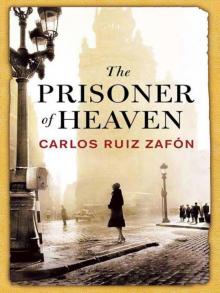 The Prisoner of Heaven
The Prisoner of Heaven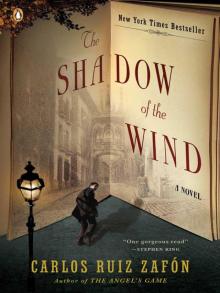 The Shadow of the Wind
The Shadow of the Wind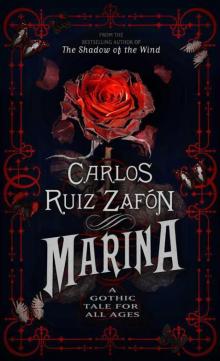 Marina
Marina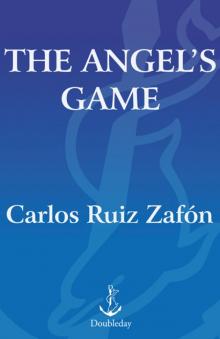 The Angel's Game
The Angel's Game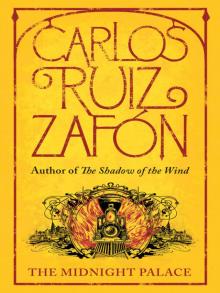 The Midnight Palace
The Midnight Palace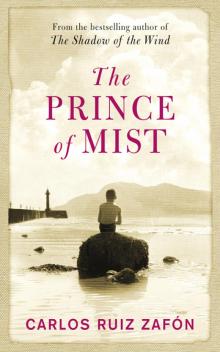 The Prince of Mist
The Prince of Mist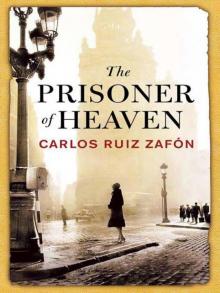 The Prisoner of Heaven: A Novel
The Prisoner of Heaven: A Novel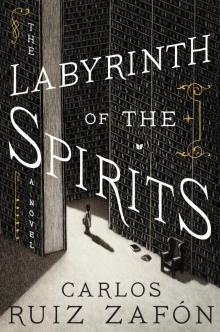 The Labyrinth of the Spirits
The Labyrinth of the Spirits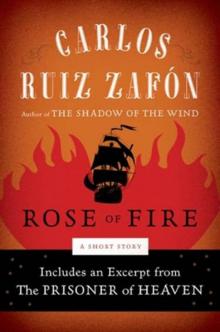 Rose of Fire
Rose of Fire